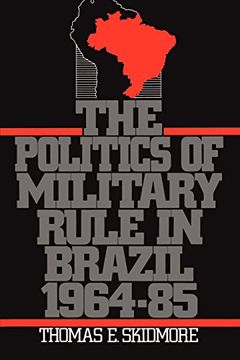Share
The Politics of Military Rule in Brazil, 1964-1985
Thomas E. Skidmore (Author)
·
Oxford University Press
· Paperback
The Politics of Military Rule in Brazil, 1964-1985 - Thomas E. Skidmore
Choose the list to add your product or create one New List
✓ Product added successfully to the Wishlist.
Go to My Wishlists
Origin: U.S.A.
(Import costs included in the price)
It will be shipped from our warehouse between
Friday, July 12 and
Friday, July 19.
You will receive it anywhere in United Kingdom between 1 and 3 business days after shipment.
Synopsis "The Politics of Military Rule in Brazil, 1964-1985"
The largest and most important country in Latin America, Brazil was the first to succumb to the military coups that struck that region in the 1960s and the early 1970s. In this authoritative study, Thomas E. Skidmore, one of America's leading experts on Latin America and, in particular, on Brazil, offers the first analysis of more than two decades of military rule, from the overthrow of João Goulart in 1964, to the return of democratic civilian government in 1985 with the presidency of José Sarney. A sequel to Skidmore's highly acclaimed Politics in Brazil, 1930-1964, this volume explores the military rule in depth. Why did the military depose Goulart? What kind of "economic miracle" did their technocrats fashion? Why did General Costa e Silva's attempts to "humanize the Revolution" fail, only to be followed by the most repressive regime of the period? What led Generals Geisel and Golbery to launch the liberalization that led to abertura? What role did the Brazilian Catholic Church, the most innovative in the Americas, play? How did the military government respond in the early 1980s to galloping inflation and an unpayable foreign debt? Skidmore concludes by examining the early Sarney presidency and the clues it may offer for the future. Will democratic governments be able to meet the demands of urban workers and landless peasants while maintaining economic growth and international competitiveness? Can Brazil at the same time control inflation and service the largest debt in the developing world? Will its political institutions be able to represent effectively an electorate now three times larger than in 1964? What role will the military play in the future? In recent years, many Third World nations--Argentina, the Philippines, and Uruguay, among others--have moved from repressive military regimes to democratic civilian governments. Skidmore's study provides insight into the nature of this transition in Brazil and what it may tell about the fate of democracy in the Third World.
- 0% (0)
- 0% (0)
- 0% (0)
- 0% (0)
- 0% (0)
All books in our catalog are Original.
The book is written in English.
The binding of this edition is Paperback.
✓ Producto agregado correctamente al carro, Ir a Pagar.

